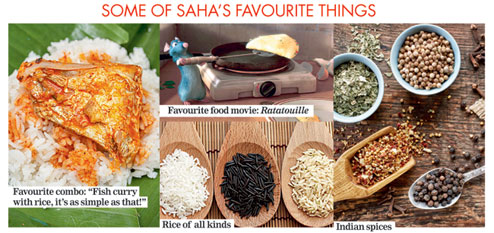Chef first and then entrepreneur, Abhijit Saha has worked with the Taj Group and The Park Hotels before owning Avant Garde Hospitality Pvt Ltd, which manages two Bangalore restaurants — Caperberry, that serves modern European food using molecular gastronomy, and Fava, that serves Mediterranean cuisine. His restaurant Saha, situated in Singapore’s National Gallery, serves regional Indian cuisine. With over 25 years of experience in the culinary industry, he is passionate about eating healthy and seasonal and feels “most Bengali when I’m eating food”. A t2 chat…
In today’s world how important is it to take small steps to eating healthy, local and seasonal?
Food is such a fundamental element of our life and if we play with it, it’s not good. There’s nothing more urgent than getting people to become more conscious about what they eat, where the food is coming from, how they’re grown. We need to educate and train our farmers to not use excessive chemicals and I believe chemical pesticides should be banned in this country. Necessity is the mother of invention. The latest example is that of demonetisation, so you know people have gone through hardship but gradually people will get used to it. If you ban it, people will feel the difficulty but then they will start looking for natural substitutes.
You’ve worked extensively with molecular gastronomy. How has it changed the food scene?
There is the misconception about molecular food that it uses chemicals, it is artificial, but that’s not true. Molecular gastronomy is the understanding of the science behind cooking and then trying to create a greater dining experience by harnessing its potential for your guests. It helps you in cooking food in a different manner, it helps you to retain the natural flavours of the food. It is a collection of cooking techniques that can be applied to various cuisines around the world. It is not a cuisine. It never says that you should not use organic ingredients or anything. It will, in fact, enhance the flavour of the food.

Pictures: Shuvo Roychaudhury
What’s your favourite food city?
Being a chef and someone who loves food, who has been cooking for 26 years and has travelled to so many countries over the world, I’m not in a position to answer this question. I find good food in so many places. I was in Italy recently and I was in Piedmont, Firenze (Florence), Tuscany and there was good food everywhere. But there are many great food cities of the world where they are upping the ante. Like Barcelona, Singapore... where there is an amalgamation of different chefs and different cultures.
In India, every city, town, village and every home has got good food. What gives us the upper hand is the fact that we’re a seasonal, regional and home-cooking cuisine. All of our food has evolved mainly from home, where mothers cook every day. So you can imagine the amount of diverse dishes in our kitchen. Also, we have this habit of assimilating things from different cultures. So over a period of time, we have influences from Mughals to Persians, from Greeks to the British, which is what makes Indian cuisine unique.
What is your favourite Bengali dish?
I love Bengali food, because that’s where I’m the most Bengali. I’ve not lived in Bengal for almost 30 years but I can say that when I eat, I feel completely Bengali. There are certain dishes that I can eat throughout my life, whether it is bhaja moong’er dal with rice, simple begun bhaja or just regular home-made maachher jhol and rice.

A big food trend right now?
To eat healthy and I hope it stays. There are two opposite movements — the fast food and the slow food — happening simultaneously in India. Everyone knows what fast food is — when you’re hungry, you eat a pizza or a burger, whereas eating in a healthy and sustainable manner is slow food. From the Indian perspective, there are a lot of dishes that can be translated into the fast food format without compromising on its nutritive value. Food that can be served quickly without losing its inherent nutrients. The moment we can manage to do that, the younger generation will take to Indian food. The quick service format can also be steamed, poached and healthy. We have to develop concepts that can achieve that.
Anything in the pipeline for Calcutta?
You can never predict what happens! It will be a day of pride if I open a restaurant in Calcutta.
Ingredients you’re fond of?
Fish and seafood. I love rice, whether it’s from Italy or different parts of India. Indian spices and herbs are my favourite too. I can’t name one because I don’t think that would be fair. Should I leave out pepper or cardamom, cinnamon or clove? I cook with different herbs and spices on different days; I cook the same pasta with different herbs on different days, same with my lamb. That’s the beauty of food... you can enjoy all its diversity.

What are you looking forward to at the Young Chef Olympiad (with t2), where you are one of the judges?
It’s a very important platform for young chefs because they’re at a formative stage. The experience that comes with it, of competing for your country at such an early stage, prepares the participants for the future. There are also a lot of cultures coming together and it would be interesting to see how people approach a particular dish or a basket of ingredients.
Text: Deborima Ganguly











